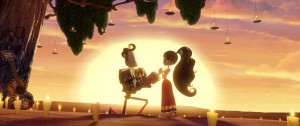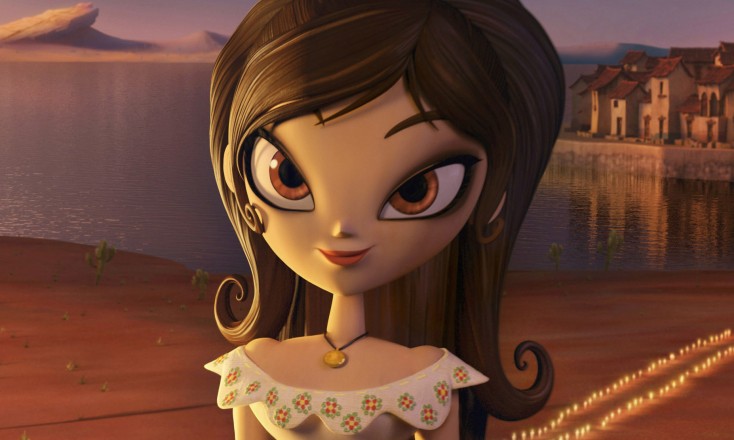
Manolo (DIEGO LUNA) woos the independent and strong-willed Maria (ZOè SALDANA) in THE BOOK OF LIFE. ©20TH Century Fox/Reel FX.
By ANGELA DAWSON
Front Row Features
HOLLYWOOD—In the colorful, folkloric, Latin-infused animated feature “The Book of Life,” Zoe Saldana provides the voice of Maria, a beautiful villager who has captured the charms of two men: Manolo and Joaquin. When two spirits take sides in the outcome of the romantic triangle, things get deadly. After succumbing to a snake sent by one of the spirits, Joaquin (voiced by Channing Tatum) has to find his way out of the world of the dead to reunite with his beloved.
Directed by Jorge Gutierrez, this animated adventure is produced by “Pan’s Labyrinth’s” Guillermo del Toro.
Saldana is no stranger to animation, having played alien huntress Neytiri in “Avatar.” was pleased to be part of the production that proudly explores Latin culture. Most recently, she played another alien, Gamora, in the box office blockbuster “Guardians of the Galaxy.” In addition to giving voice to her character in “The Book of Life,” the actress, who is of Latin heritage, gets to sing.
Q: Can you describe your character?
Saldana: I play Maria. Maria is this doting daughter that really wants to make her father proud but also wants to find her true voice and is a very confident and feisty individual who believes in the power of her convictions but also believes in the virtue of her friends. Sometimes she just wants to continue to grow and be allowed to be an equal amongst all the men.
Q: Guillermo said you were able to nail the vocals on the first take. And the composer Gustavo Santaolalla said that you should release an album. Is singing something you would like to pursue down the line?
Saldana: I keep saying that I wouldn’t mind to go platinum in Japan. I really mean it. I sang when I shot “Nina” (in which she played vocalist Nina Simone), and I worked vigorously with an amazing voice coach. So by the time I started doing the sessions for “Guardians,” and we got to sing, it had just been a year, so I just sort of still remembered all those things. It’s amazing what you discover that you’re able to do once you really put your body and your soul into a skill, and you try nothing but to master it. You discover a lot about yourself; that you can actually do something if you put your mind to it. So I realize that I’m not that bad. I’m not as tone deaf as I thought I was. (She laughs.) And some people would appreciate my shower singing. It was fun.
Q: What was it like working with Guillermo and Jorge?
Saldana: Guillermo was an amazing godfather for this project and he believed and he fought for Jorge to have his vision. This is a story that basically grew from Jorge and his wife, and Guillermo just needed to support this artist. So every frame of this movie that I see, I see Jorge and I see his big heart and I see the pride that he has in his culture, in his upbringing, how beautiful he saw his life growing up and how colorful it was. And I feel like Guillermo was able to sympathize with that, identify with it greatly, and therefore felt a need to fight for Jorge to get his vision to come to life.
Q: Did it attract all of you to the film to have very strong female characters and then male characters that also have a very soft side to them?
Saldana: Yes. You deal with friendship. You deal with people trying to find their place and trying to find their own voice, without losing the respect of their peers. You’re dealing with the beauty of a culture that even though we’ve been neighboring since the beginning of time, since the beginning of America, neighboring with but we’ve also been living with and yet there’s so little things that we know. The Mexican culture is so beautiful. There are 250 different indigenous dialects in Mexico. The fact that they celebrate their family should be nothing but an inspiration for all of us as a universal culture to bring levity to life and immortalize our loved ones. What if eternity is that— just keeping a memory alive of a loved one? And it’s also an educational tool because it’s going to give parents the ability to be able to have that tough conversation with their kids and their younger ones that even though they understand more than we would want them to, we don’t accept that. It’s difficult for us to communicate that. But they’re ready. They’re ready to listen. And we do so by bringing this animated film about death that brings so much peace and purity and color. You can identify with them through the loss that you probably share or that you will at some point, unfortunately. You get to schoose a way to cope with it in a way that doesn’t have to be heavy or burdened. Everything about this movie is positive and so enlightening for me.
Q: With this character and other characters you’ve played lately, you’ve been a role model to little girls everywhere. What does that mean to you to be in that position?
Saldana: It means everything. I can only hope for to be a part of a world where a woman is equal to a man and has the permission and the right to dream anything that she would want to be. And there is nothing inhibiting her from doing it. So I don’t see myself as playing it purposely. I’m playing strong female characters but I’m playing real women. A woman possesses so many virtues besides just beauty and weakness and vulnerability and sexiness or whatever. Women everywhere around you—your neighbors, your parents, your friends, your wives, and your daughters—we’re strong. We’re feisty. We’re intimidating. We are challenging. So if I can have a choice in terms of the material that I want to leave behind for girls to pick up, I want to be a mirror to them. This is who you are. Nobody needs to give you the permission. Nobody needs to give you the acceptance. This is what you see in the mirror then this is what you should always fight to see and support. And whoever doesn’t do that in your art, you need to use your voice and say, “Actually. That is not an accurate depiction of who I am.” I want to live in a world and in my career as an artist where I won’t be told, “You purposely play strong roles.” No, I’m purposely playing women because that’s who I am. I don’t know anyone else to be.
Q: You’re career has been on fire these last few years. You don’t plan on slowing down anytime soon, do you?
Saldana: Well, I might need to slow down to breastfeed. (She laughs.) But other than that, the sky is limit. As long as I wake up every morning with the passion to be an artist, I’m going to continue knocking on doors, breaking down barriers and playing as many roles as I possibly can.
Q: Is it special for you to be able to share this film with your kids one day?
Saldana: I’ll be cool for them. (She laughs.) You’re cool to your kids until they are like 6 or 7. I have an 11-year-old niece and no matter what I do—I can be painted green or whatever—she still like rolls her eyes like “You don’t know anything about ‘Doctor Who.’ Go away!” (She laughs again.)
Q: Being part of three big studio franchises, does it ever get schizophrenic between them all?
Saldana: It does. At night.





